


In mid-July 2023, we were present in Ngoc Lam commune (Thanh Chuong). This is a resettlement commune with the majority of ethnic minority people who migrated from the Ban Ve hydroelectric reservoir area (Tuong Duong), more than 15 years ago. Joining the comrades of Ngoc Lam commune police to go to each village to propagate to the people about activating new electronic identification, we can clearly see the hard work of the officers and soldiers in the efforts to implement Project 06.
Senior Lieutenant Ngo Xuan Duy - a police officer of Ngoc Lam commune, who was assigned to be in charge of implementing Project 06 in Ngoc Lam commune, shared: The people here are mainly ethnic minorities, so the propaganda and implementation of Project 06 sometimes face many difficulties. However, in the "70 days and nights" campaign to issue Citizen Identification Cards to the people, Ngoc Lam commune has become the first locality to reach the finish line in Thanh Chuong district. To do that, the local Standing Team consisting of 7 officers and soldiers went to every house, invited the village management boards and gathered each cluster of villages to implement. In addition, the local leader, the Chairman of the Commune People's Committee, also directed mass organizations to build an implementation team in each village with a regular police officer as the team leader. Therefore, in just a short time, up to now, 4,547 people of the right age have been issued Citizen Identification Cards. There are only about 2,000 people left due to incorrect surnames and inconsistent data waiting to be added.
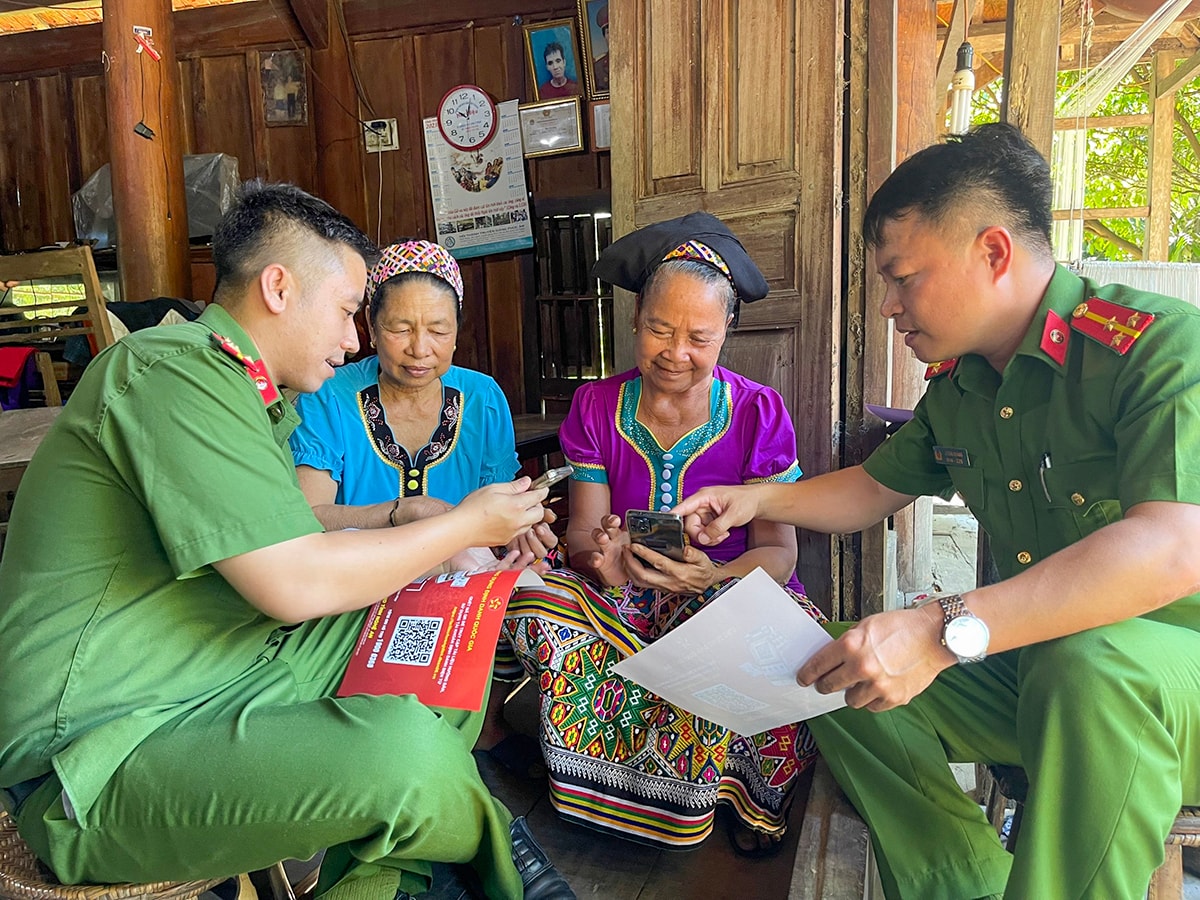
Senior Lieutenant Duy added: After noticing the data discrepancy, the Standing Team invited the leaders of PC06 Department, made a written request to Department C06, the Justice Department of the district, the commune justice department and searched all the previous archives; at the same time, went back to Tuong Duong, where the people used to live before moving to the resettlement area... Then, they agreed on the data and documents and made a file, requesting the superior agency to issue new citizen identification cards to the people.
In Ngoc Lam commune, many young people and working-age people have gone far away to work, and many households have even returned to the Ban Ve hydroelectric reservoir area to make a living. Therefore, the Standing Team went to their homes, conducted a basic investigation at all four levels, then divided the staff, called directly to the nearest local police station to support citizens to come to work to activate their electronic identification.
According to statistics, as of June 30, 2023, Thanh Chuong district has collected 94,722 electronic identification accounts. 84,985 level 1 and level 2 accounts have been activated, reaching 75% of the target assigned by the Ministry of Public Security. In addition, 197,896 electronic chip Citizen Identification cards have been issued, out of a total of 201,340 eligible people (over 14 years old), reaching a rate of 98%.
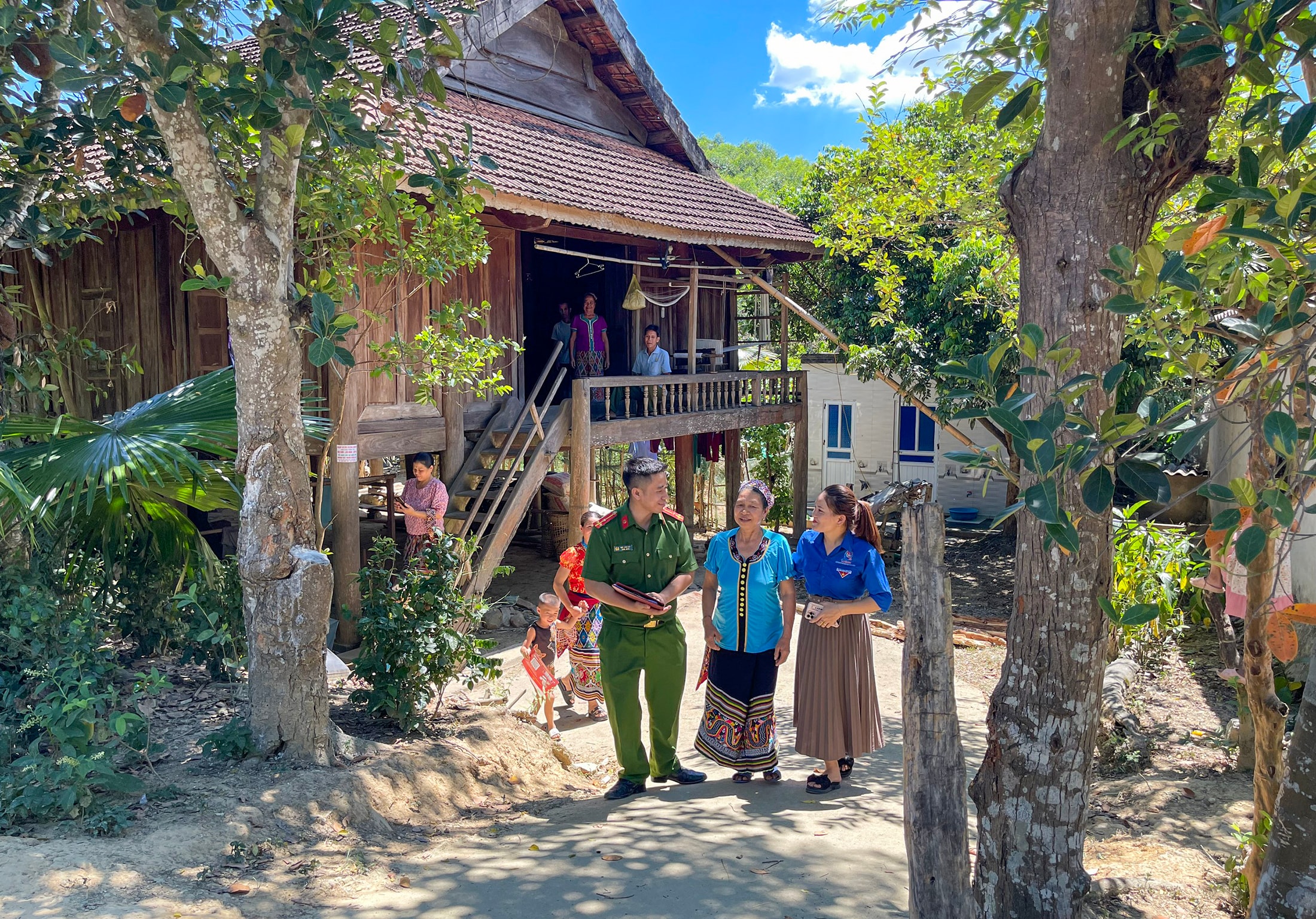
According to Mr. Trinh Van Nha - Chairman of the District People's Committee, concurrently Head of the Working Group implementing Project 06 of Thanh Chuong District, shared: Clearly identifying the importance of Project 06, the District People's Committee has focused on leading, directing, implementing drastically, synchronously and determinedly completing the task excellently. During the implementation process, the District People's Committee has issued 4 Decisions, 5 Plans, 7 Official Dispatches directing and implementing Project 06.
Mr. Nha said: Regarding the group of utilities serving economic and social development, the Working Group directed the District Health Center to coordinate with the District Police to successfully clean and synchronize vaccination data into the National Population Database for 132,768 cases. In addition, data was cleaned for 5,775 social insurance data (reaching 100%); cleaned 15,270 data on labor, war invalids and social affairs information...
In Cua Lo town, we (PV) were introduced to Nghi Thu ward, which was chosen as a pilot area for Project 06 implementation in this coastal town. At the time we were there, officers from the Social Order Administrative Police Team, Cua Lo town police were using the information receiving machine to make a citizen identification card and integrate the activation of electronic identification for Ms. Che Thi Bich Lien, a citizen of Nghi Thu ward but currently residing and having a family in Taiwan.
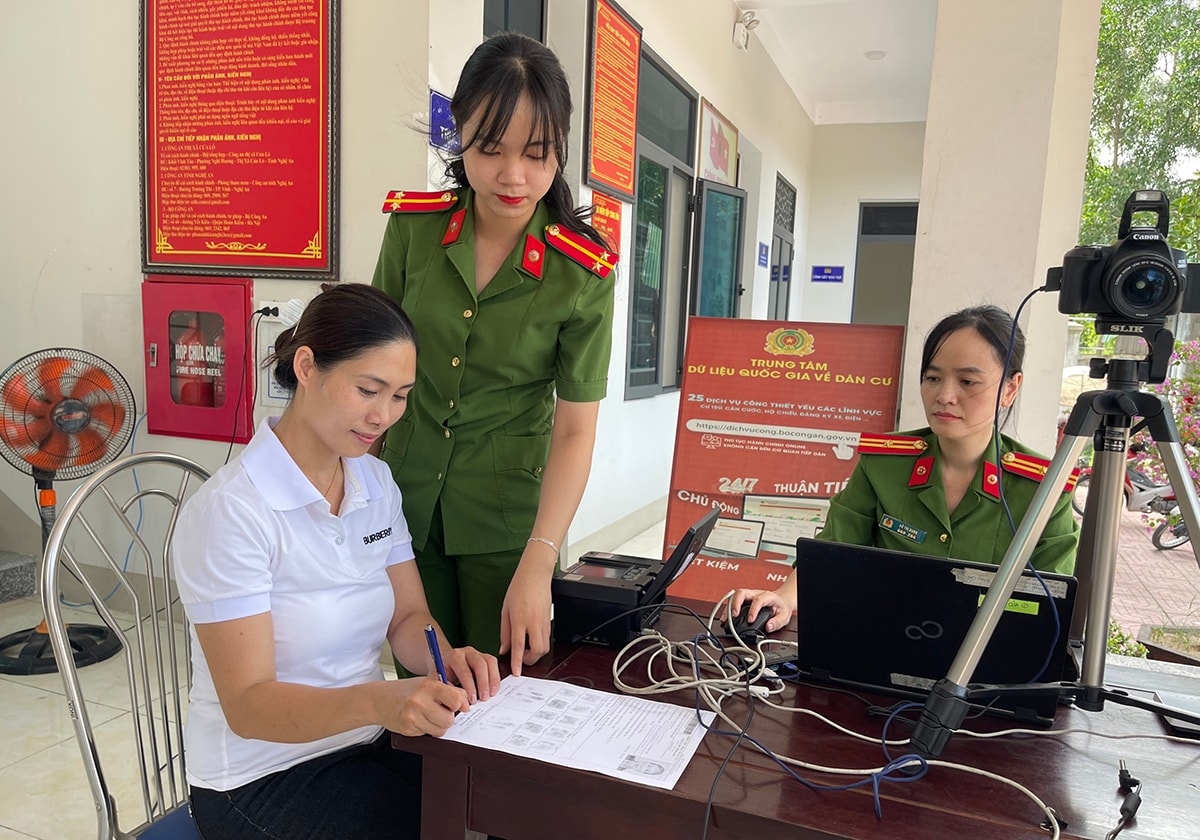
Ms. Lien said that in 2006, after finishing high school, she decided to go to Taiwan to work. After working there for a while, she decided to get married to a Taiwanese man, but still kept her Vietnamese nationality. Previously, when Ms. Lien went to work abroad, her personal documents were all old-fashioned documents such as ID cards, family registers, etc. After her family called to inform her that the State was currently issuing citizen identification cards and activating electronic identification, she took advantage of her vacation home and was assisted by Nghi Thu Ward Police officers to complete the procedures for issuing citizen identification cards.
Having the police officers of the ward and the Police Team for Administrative Management of Social Order, Cua Lo Town Police brought the machine to her place to support her in making a citizen ID card, Ms. Lien was moved to say, "I did not expect that nowadays, issuing a citizen ID card is so convenient, not to mention the personal utilities are also integrated, especially the passport change, the procedures for boarding a plane can also be done quickly, which makes me very happy."
Nghi Thu Ward currently has 4 blocks with 1,411 households and 5,695 people. Currently, 3,448/3,962 citizens are eligible to receive electronic identification. Of which, 442 citizens are not eligible to receive electronic identification due to being abroad, not using a phone... In addition, 3,331/3,962 people are eligible to receive and activate electronic identification accounts.
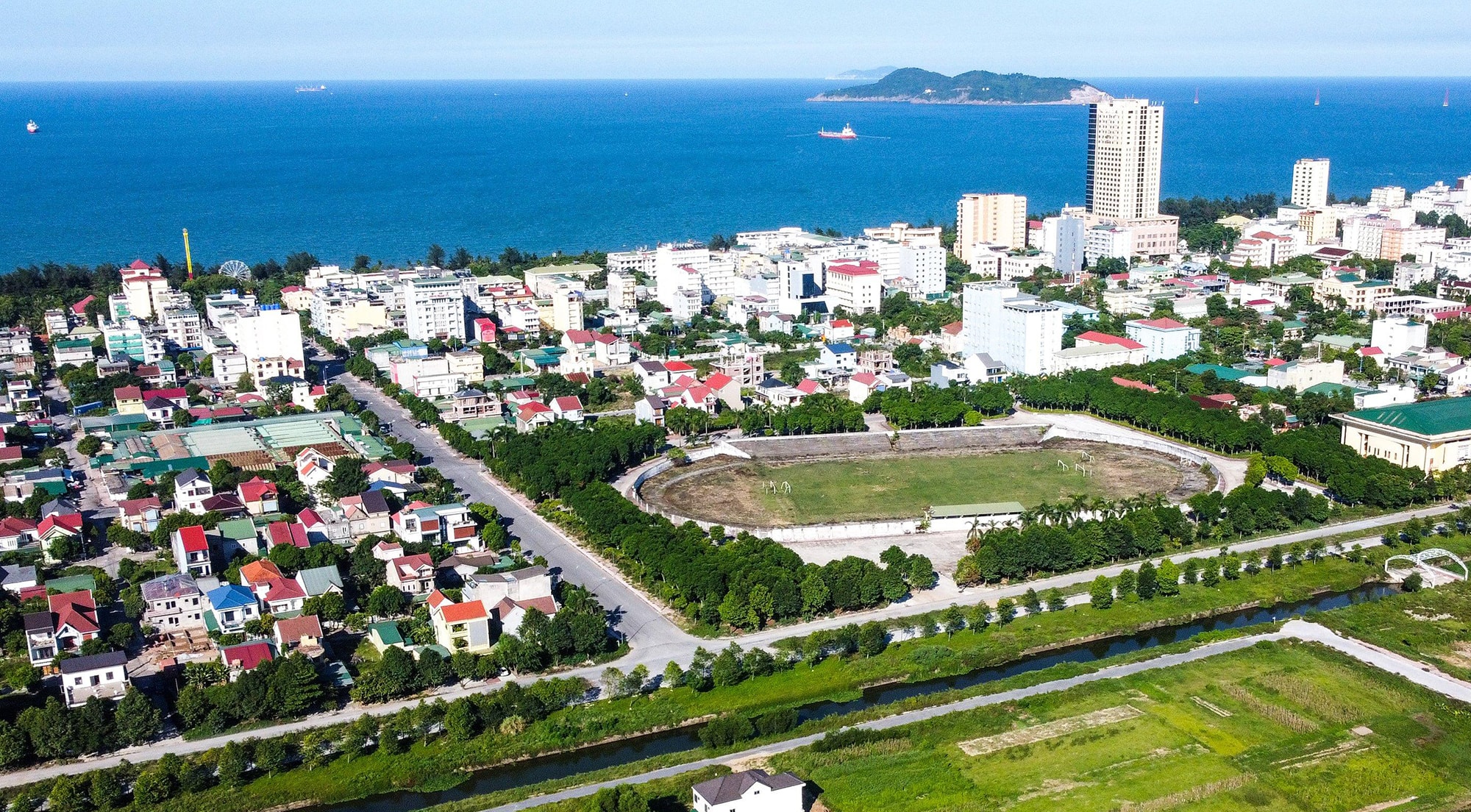
According to Major Nguyen Van Nam - Head of Nghi Thu Ward Police, there are about 250 citizens in the ward participating in labor export abroad. Although their information has been recorded, because they are working abroad, they cannot be issued citizen identification cards, and cannot activate electronic identification. Some cases have made citizen identification cards and then left for labor export but have not activated electronic identification because they no longer use phone SIM cards, so they cannot activate level 2 electronic identification.


Up to now, the implementation of Project 06 in Nghe An has been more than 1 year. Although there are still many difficulties, thanks to the efforts of departments, branches, and local authorities at all levels, the framework of the population database in the whole province has been basically completed. In particular, with the leading role in implementing Project 06, Nghe An Provincial Police has proactively advised the Provincial People's Committee on many plans and solutions for effective implementation.
Colonel Luong The Loc - Head of the Department of Administrative Management of Social Order, Nghe An Police said: As the standing agency of the Provincial Working Group implementing Project 06, the Provincial Police has proactively advised the Chairman of the Provincial People's Committee on directive documents, compiled reports, updated data; proactively developed plans and directly inspected and urged sectors and localities to implement the tasks of Project 06.
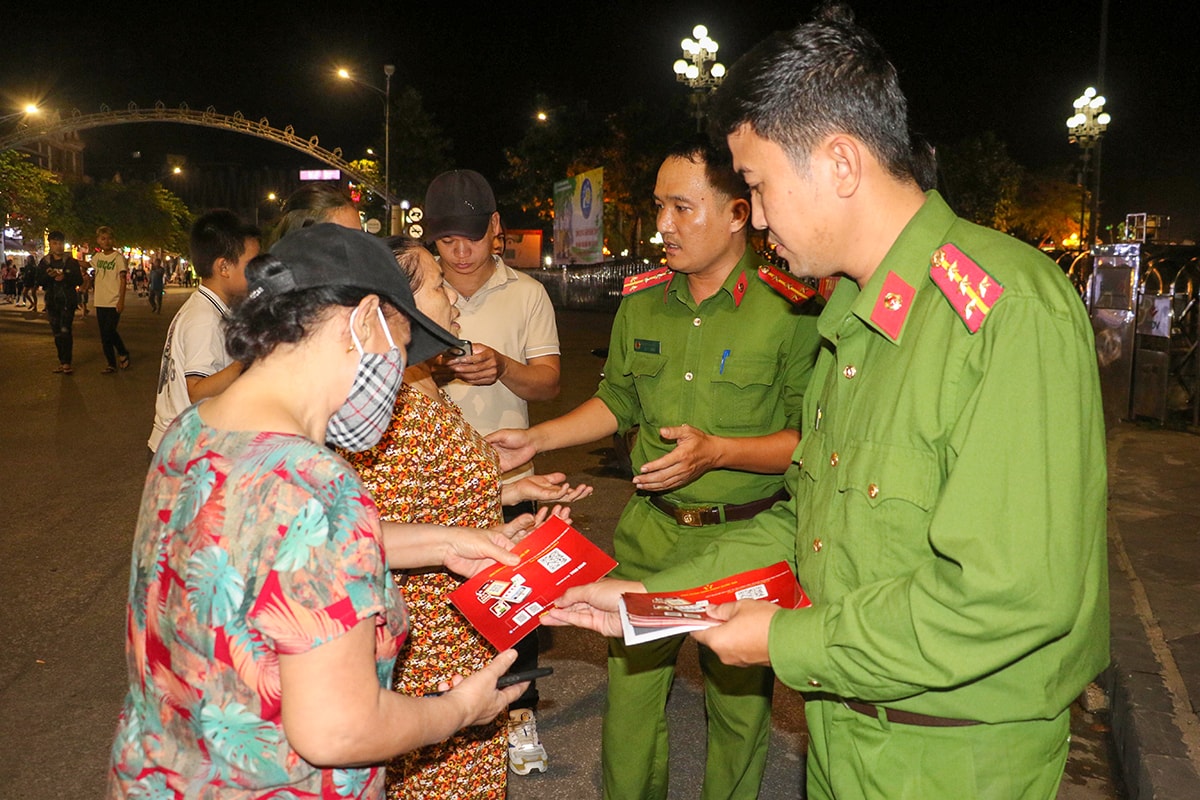
The police of units and localities have also organized propaganda for Project 06 on social networks, electronic news sites, groups... to "green" positive information. At the same time, they mobilized and guided people to implement Project 06. In particular, the authorities have built a model of propaganda points, guiding people to install and activate electronic identification, and providing public service instructions. Specifically, at the walking street of Vinh City, every Friday and Saturday evening, the police force and youth union members organized propaganda, guiding people to install and activate electronic identification accounts. Therefore, in just a short time, 5,560 people were instructed to install and activate level 1 electronic identification and received over 3,200 level 2 electronic identification accounts.
In particular, Nghe An is currently one of 14 localities nationwide that has completed the earliest connection of the national population database system with the provincial administrative procedure settlement system. After more than a year of devoting all efforts to implementing Project 06, people and businesses have initially enjoyed certain results. The population database has been applied to perform tasks in various fields, especially in many essential public services, helping to manage in a unified, centralized, transparent, convenient, economical and effective manner.
In particular, some public services have been deployed to bring convenience to people and businesses, and have been approved and supported by the people, such as: Registration of permanent residence, temporary residence, temporary absence, and residence; issuance, re-issuance, amendment, and supplementation of ordinary passports; registration and issuance of license plates for motorbikes and scooters; collection of fines for administrative violations in the field of road traffic through recording devices... In particular, the benefits of Project 06 have been effectively applied in people's medical examination and treatment or when people go to do administrative procedures at the One-Stop Transaction Center.
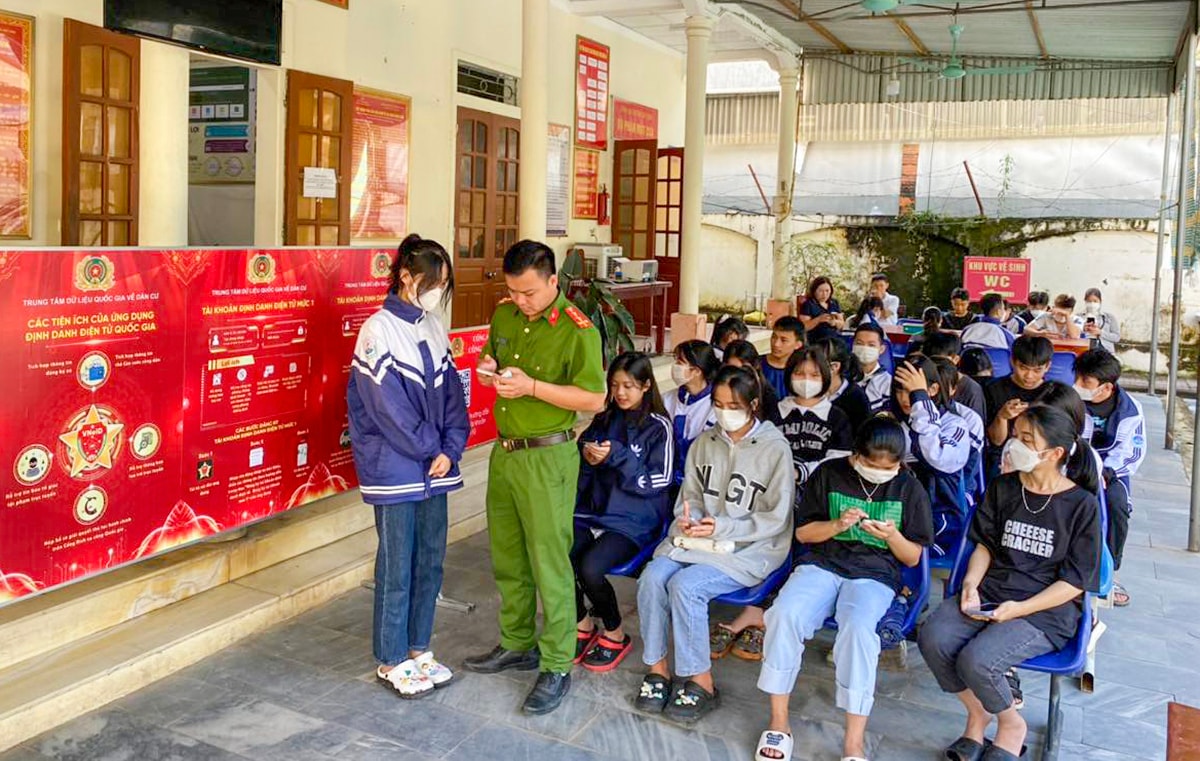
Mr. Le Viet Thuc - Deputy Director of Nghe An Provincial Social Insurance said: Implementing Project 06, the Provincial Social Insurance is assigned to review, synchronize, and clean up data of social insurance, health insurance, and unemployment insurance participants with the national population database; digitize and reuse the results of digitizing records; make cashless payments to beneficiaries of social insurance and unemployment benefits. At the same time, it is assigned to preside over essential public services such as: Integrating deductions in the extension of health insurance cards by household; registering for health insurance cards.
In addition, it also coordinates with a number of relevant agencies such as the Department of Health to direct medical examination and treatment facilities in the province to deploy receiving patients for medical examination and treatment under health insurance using chip-embedded Citizen ID cards or via the VNEID application according to the instructions of relevant competent agencies. Currently, 528/528 medical examination and treatment facilities under health insurance have implemented the use of Citizen ID cards to replace Health Insurance cards in medical examination and treatment. More than 2.5 million health insurance cards have been synchronized with personal identification numbers and Citizen ID cards for medical examination and treatment (reaching a rate of 90.4%, ranked 4th nationwide).
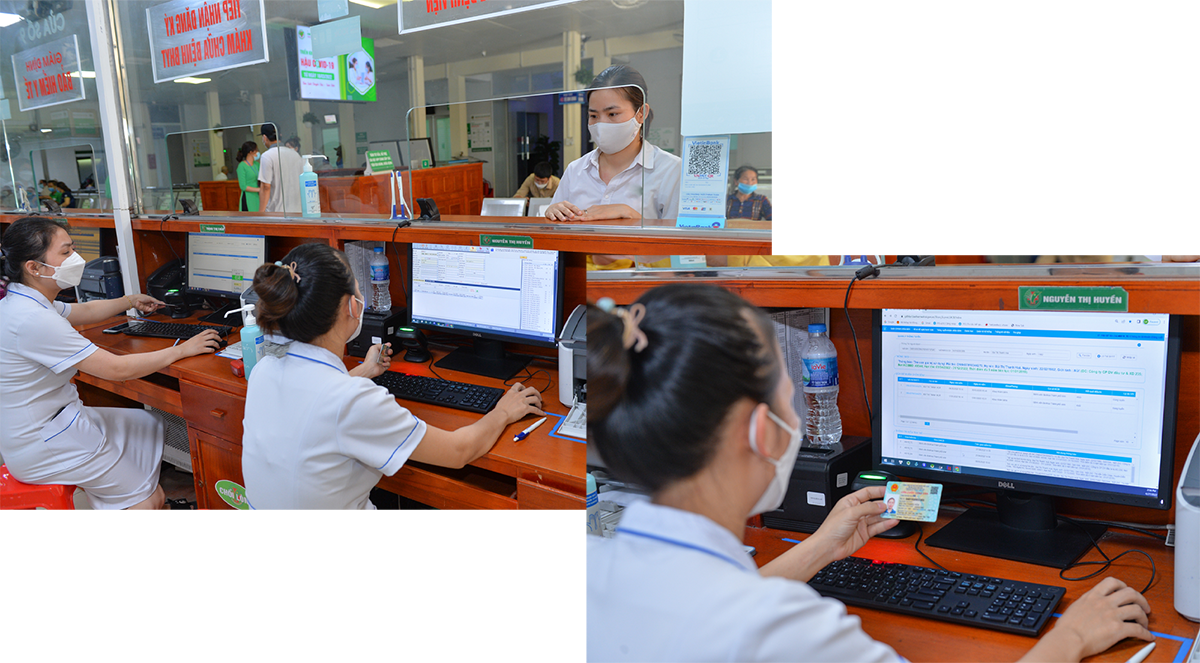
At the Department of Labor, War Invalids and Social Affairs, implementing Project 06, the unit has also supplemented missing information fields for 66,673 households, 268,447 people (poor households); 56,289 households, 236,503 people (near-poor households); 69,830 meritorious people receiving one-time allowances, 51,672 relatives of meritorious people and 41,683 meritorious people receiving monthly allowances of 21 districts, cities and towns. Implementing child data cleaning and standardization, identification codes have been added for nearly 860,894 child records managed in the child database.
It can be seen that Project 06 clearly identifies that people and businesses are the center of digital transformation; taking human development, ensuring and improving people's lives as the goal. Organizations and individuals enjoy the best benefits through public administrative services, social security and access to commercial services through electronic identification. The implementation of Project 06 is also likened to building a backbone of e-Government, which is very important for serving socio-economic development and national digital transformation.
